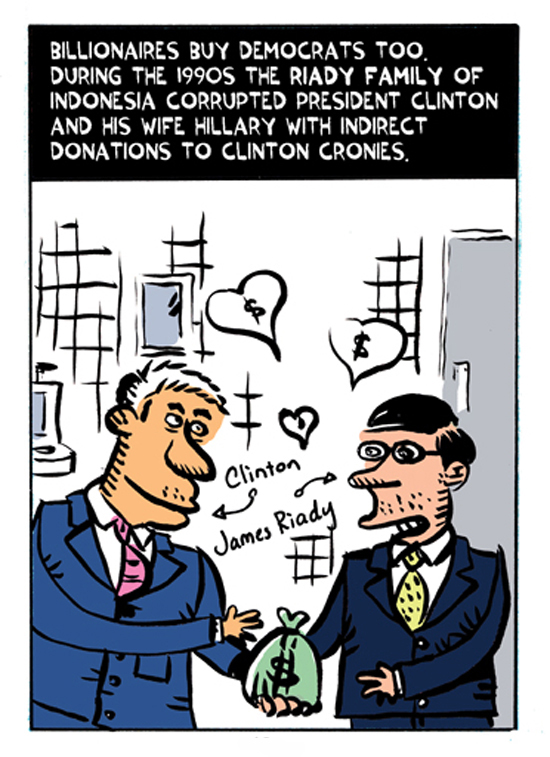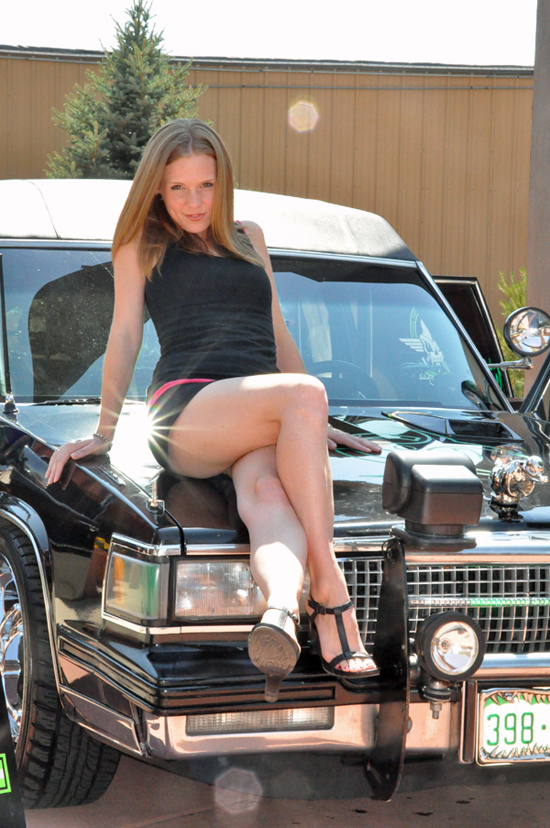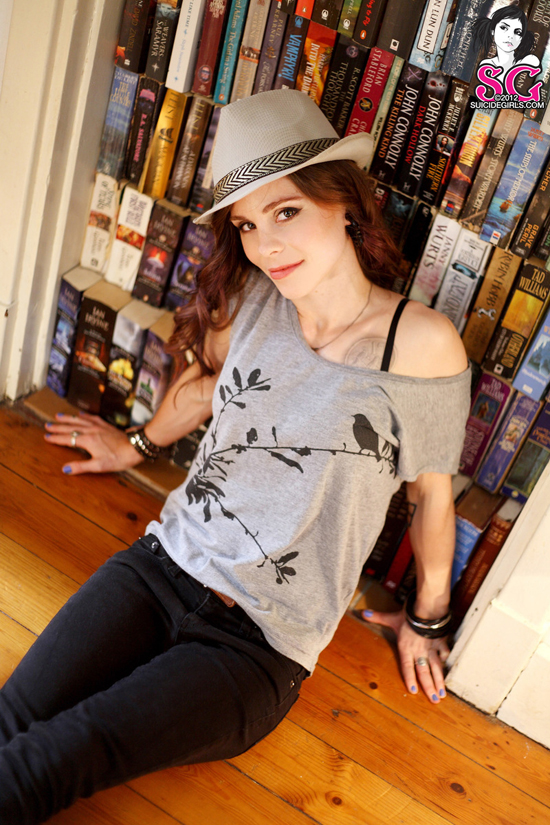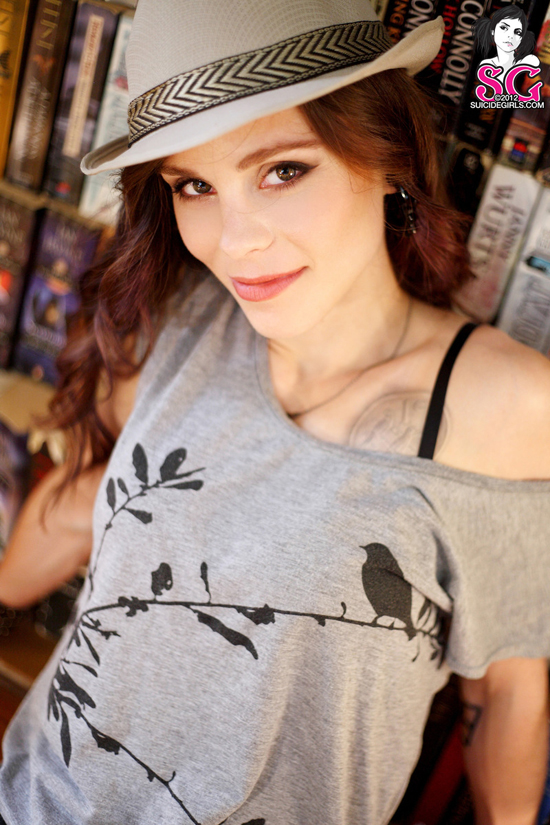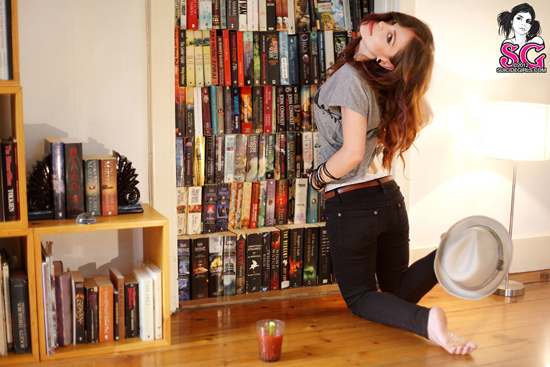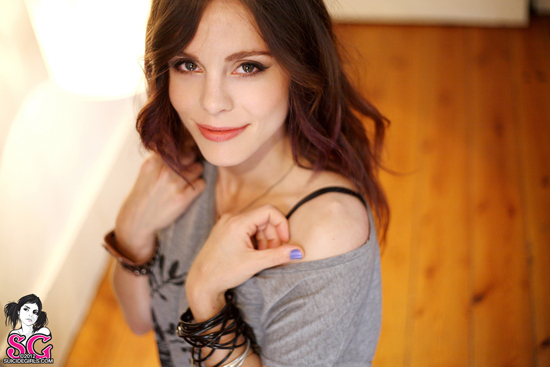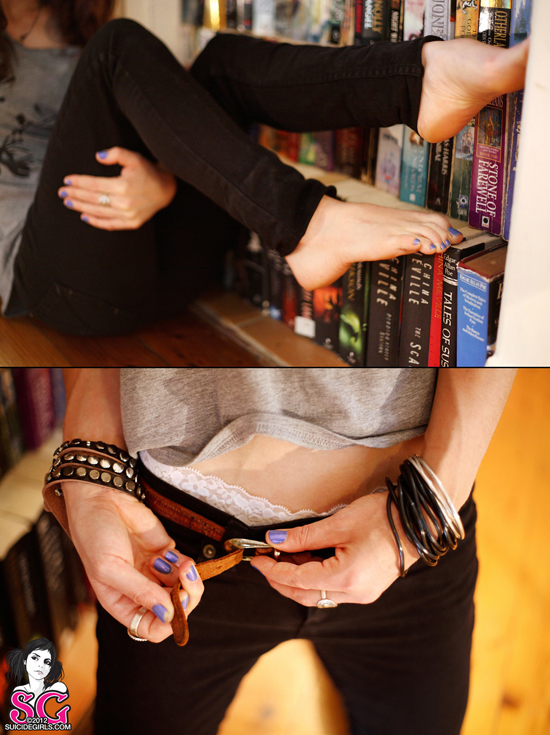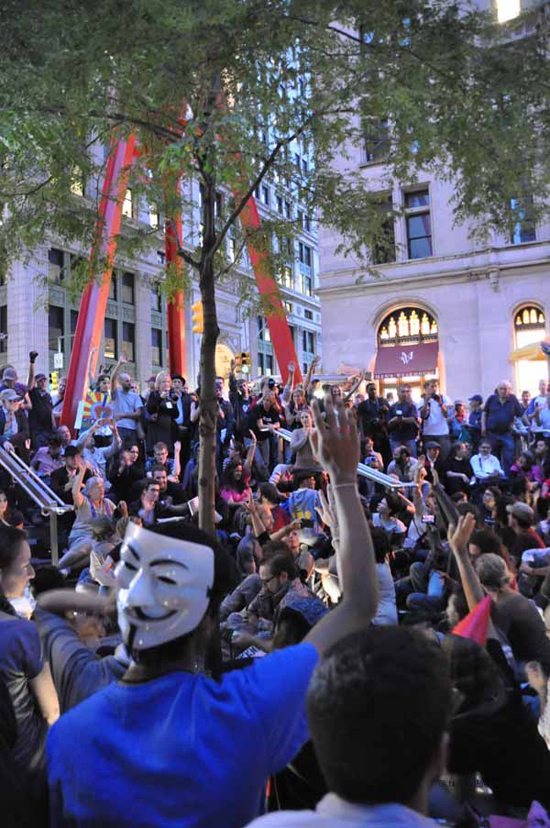
[#S17 Popular Assembly in Zuccotti Park]
My goal was simple: to make it through the long Occupy Anniversary weekend with my person, camera, flash memory, and liberty intact. I managed to do this, but many of my fellow activists and journalists didn’t.
An organizer I’d chatted with while covering a protest outside Mitt Romney’s fundraising breakfast for billionaires on Friday, September 14, was essentially preemptively picked up two days later during a Sunday afternoon Occupy Anniversary concert at Foley Square. When we’d spoken, he’d voice concerns about the possibility of arrest since his name was on an #S17 Facebook event page. It therefore wasn’t a complete surprise when I heard he was indeed taken off the streets by authorities ahead of the big day.
I’d also witnessed multiple arrests while shooting a march to Zuccotti Park on the Saturday night, and over the weekend a pattern of a snatch and grab arrests targeting journalists had started to emerge* – likely in an effort to get their cameras off the street (the authorities apparently don’t like it when the whole world is watching their misdeeds). I therefore approached Monday, September 17 with a good deal of caution. Indeed, to an extent, it would be accurate to say law enforcement’s intimidation tactics were working on me.
A serious back injury means my running days are over – and being tackled to the ground might mean even my walking days are – so I was not exactly physically suited to covering the planned #S17 wildcat marches and swirl of mini-occupations in NYC’s financial district. Instead, I chose to cover a more chill gathering in Battery Park ahead of the big evening birthday Zuccotti Popular Assembly.
The park is supposed to be open to the public 24/7, however, shortly after the birthday cake was served, at 10 PM a mixed group of NYPD and private security employed by Brookfield (Zuccotti’s corporate owners) swept the high spirited but mostly well-behaved occupiers out. The park had been surrounded by barricades and a heavy police presence throughout the day, and with around 180 activists and journalists – not to mention a startled Wall St. trader (who was guilty of getting his iPhone out at the wrong time), an NLG legal observer, and a priest (I wish I was kidding) – already behind bars, most quit while they were ahead and called it a night, though a core group refused to be moved by the legally questionable display of force.
With Occupy gold in my camera I headed home to edit and upload my photos, however one of my colleagues who’d been covering the swirls of resistance I’d missed wasn’t so lucky. I’d been introduced to photojournalist Julie Reinhard via Occupied Stories, an OWS affinity group dedicated to publishing first person accounts from the movement. The group had asked to republish my series of posts from the Chicago NoNato protests in May of this year, and I’d since met up with them in person in New York. Julie is a very sweet, kind, and conscientious individual. She is certainly not the archetypical “trouble maker” you’d expect to see in the crosshairs of the NYPD. But then these are strange times, and our police forces nationwide seem to have a strange idea about who they’re there to protect and serve.
Below is Julie’s first person September 17 story. Suffice to say, it didn’t end quite they way she expected.
– Nicole Powers, SG Ed
UPDATE: 24 September, 2012
* Case in point, radio show host John Knefel, who just days before had interviewed SG contributor Greg Palast for his popular Radio Dispatch podcast. He’d fallen victim to NYPD’s snatch and grab tactics, and had written about it in a blog for Truthout. A video subsequently surfaced on Youtube which clearly shows three police officers pulling John off the sidewalk (where protesters were permitted to be) and into the street, where he was arrested in an exceedingly brutal manner.
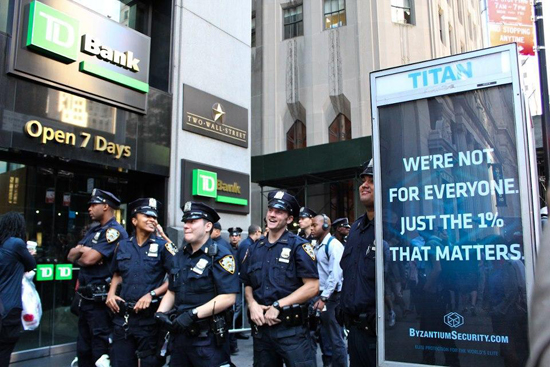
[image courtesy of: @reclaimuc]
My #S17 Arrest by Occupy Photojournalist Julia Reinhart
There’s rarely a dull moment when they go marching in the land of Occupy, and the weekend of the one year anniversary ramped up to revive a lot of the energy seen swirling around Zuccotti Park last fall.
After a year of shaping their vision, forming their message, and battling with the police, the movement had a broad range of actions planned for Monday, September 17th, the day of the anniversary of the first tent pitched in Liberty Plaza [now know by its corporate “slave” name Zuccotti Park]. The overall plan showed that the past twelve months have forced Occupiers to evolve. No longer would the activity be focused on one massive march, but rather dispersed and mobile, adapting to responses by the police, but with the same goal they had from the beginning: To protest the machinery of Wall Street finance by shutting it down.
As I arrived near Zuccotti Park around 6AM, NYPD forces where already out and ready. Wall Street was barricaded from all sides, as was Zuccotti Park, the bull statue and parts of Broadway. The news media was out in force, with TV trucks clogging both sides of Broadway. Little brings out the news crews in New York City like the possibilities of a potential blood bath…Both the police and mass media seemed ready for that. But the occupiers had other ideas.
By 7AM, about 500 protesters had assembled in one of four assembly points, and led by Episcopalian bishop George Packard and other clerics, started marching down Broadway towards the intersection with Wall Street. The original plan was to block the intersection by sitting down in the street. However, barricades set up by NYPD forced protesters to stay on the sidewalk, and, rather than – as in the past – trying to battle their way through the barricades, the protesters decided to make their point by sitting down on the sidewalk instead. Still, the arrests quickly began, as now they were obstructing pedestrian traffic. The thought that maybe the barricades and lines of cops the NYPD had set up might do a better job of blocking passage than anyone sitting on a pavement ever could probably didn’t occur to the police commander in charge of the scene.
I had found myself stuck in the press penn that was handily provided on one corner of the intersection of Wall Street and Broadway, so I couldn’t see the actual arrests, but several arrestees were quickly led away. Looking for more freedom of movement and better angles for observation and photography, I decided to change venue and moved down Pine Street towards Nassau Avenue. As I reached the intersection of Nassau and Pine, the back side of Federal Hall, another popular flashpoint between OWS and NYPD, I encountered mayhem. Police had started to arrest protesters in this location and cops were grabbing at anything and anyone that couldn’t run fast enough – including a legal observer from the National Lawyers Guild, even though he was clearly marked by wearing a bright green hat marked “NLG Legal Observer.” I took some photos of arrests, but soon decided to move on further down towards Wall Street as I heard there were some activities going on there.
As I walked down Wall Street, protesters were marching on the sidewalk across the street from me, chanting and gearing up to block the intersection of Wall Street and Pearl. A massive contingent of police scooters along with cops in riot gear were standing at the ready. A police officer started to read out a dispersal order to the protesters assembled at the street corner, and anticipating a new sit-in and some arrest shots, I crossed the street to photograph the officer with his megaphone, as well as any upcoming interactions.
As I started photographing the scene – the cop with his megaphone and other officers standing around watching the protesters – I hear a voice over the megaphone saying: “If you don’t move, you will be arrested.” I took one more shot of the cops standing at the corner, when the white shirt officer in charge of the scene pointed at me and said: “That’s it. She’s done. Take her.” He promptly grabbed my hand.
I shouted out that I’m an independent photographer, and showed him my credentials from the National Press Photographers’ Association. The officer looked at my badge and said “they’re not ours, so I’m not interested.” (an independent account and a great photo can be found here) I was spun around and felt the zip ties tighten around my hands. This being my first arrest, I was surprised that I felt relatively calm and just let them do their thing, but I did notice that the cuffs were beginning to cut off the circulation in my hands.
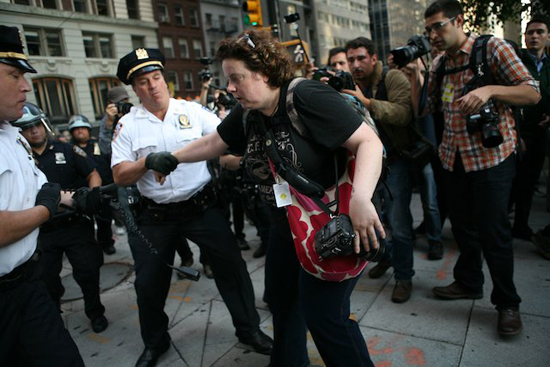
[Photo of Julia Reinhart being arrested by Jessica Lehrman of Gothamist]
The white shirt officer handed me off to one of the cops standing next to him in riot helmets, and designated him to be the arresting officer, which meant he was now in charge of bringing me to the station for processing and staying with me until I was either released on a Desk Appearance Ticket or sent to court for arraignment. A couple of legal observers took my name and information, and several other observers asked for it too while I was being led away. At least I felt people would know where to look for me.
As I was being led to a van, my arresting officer was told that he couldn’t put me there as only contained males. So the officer turned around and called over the radio, “I have a body. I need a car.” While I was out of commission for the moment as a photographer, I still felt very much alive, and found that description of me rather disconcerting. Yet, the numbness in my hands continued to increase, so I decided that, rather than getting into argument with him over terminology, I’d plea my case for getting the cuffs loosened enough for the blood to be able to flow to my hands. The officer explained to me that the zip cuffs they were using could not be loosened without cutting them, and he couldn’t do that unless I was in a van. We walked back and forth searching for a van for me to be put into for another 10-15 minutes, until I was finally placed in front of a door, photographed with a polaroid camera, and placed into a bus – joining four others already in there with my backpack still on and my camera and press pass hanging down my front. When I asked again to get my cuffs loosened, the officer said he didn’t have a knife, so that would have to be done at the station.
Other arrested protesters joined us in the bus and a dialogue started soon amongst everyone: About the day’s protests, Occupy’s philosophy and other topics. One of the protesters started making his case for Occupy to two of the arresting officers sitting with us in the van, who seemed nice enough to engage in the conversation. Whether any hearts and minds were changed remains to be seen, but it seemed clear that once the confrontation of the actual protest was out the way a civilized conversation was possible to be had. Plus, the boss wasn’t listening, and some rank and file officers were not all that unsympathetic.
Blue shirted NYPD officers have been working without a contract for four years now, as their union and police leadership seem unable to come to an agreement over the officers’ compensation terms, pensions being a big bone of contention. The law however forbids providers of essential government services, such as the police department, to strike, so the officers have to keep working while negotiations drag on. Seems the plans being discussed for potential contract resolutions don’t sound attractive to those in the lower ranks.
Before the cops were ordered out of the van again to accommodate more arrestees, one of them finally cut my cuffs. Bt this time my hands were a darker shade of blue and deep imprints from the edges of the cuffs were visible on both my wrists. I was allowed to take off the backpack, put the camera into my bag, stretch out my fingers for a second, before I had to be re-cuffed, thankfully looser this time.
Overall the atmosphere in the van was quite festive. The other arrestees seemed to be at peace with their situation and were looking to make the most of it. One of the late arrivals managed to access his cell phone and started livestreaming from our van. Another one, sitting next to him started reciting some rap poems he had written about Occupy, manifesting some accute wordsmanship and creativity, while another protester accompanied him with a beat by banging against the backwall of the van.
About 90 minutes after my arrest, we were finally delivered to Central Booking at 1 Police Plaza for further processing. There I noticed that we were referenced to as “perps” (short for perpetrator). While this term may seem a tad less dehumanizing than “body,” it still felt hardly appropriate for a group of people arrested for such “crimes” as sitting down in an intersection or photographing on the sidewalk.
As we here herded across the outer courtyard of Central Booking and had our names and addresses taken, any bags etc. were removed. At this point the treatment I received seemed reasonably courteous. I had requested that the Swiss consulate be notified of my arrest, which seemed to make an impression. While I wasn’t necessarily expecting the need of diplomatic interference, I felt it important to ensure access to it, should the need arise. Given how little control I had over my every move (“two steps over here, back against the wall, one step over there”) it also felt good to mark at least a little corner of my territory.
I was pulled aside with another arrestee still wearing his press credentials around his neck. He was a livestreamer and reporter for a website based in Portland, Oregon. We were asked where our work could be seen and what we were doing exactly, then the questioning officer went away. I’m not sure whether he was a regular plain-clothed officer, but he was dressed in civilian clothing. Finally, my press pass still hanging around my neck, I was led into the back door of Central Booking, where my identity was verified. I had to pose for another photo – this time with the arresting officer – and was placed into a holding cell for further processing. My arresting officer seemed pleased with the photo of the two of us and showed it to me. I jokingly asked him whether we should put it on Facebook, he laughed but said no and that he didn’t want to be tagged.
In the holding cell I met one of my colleagues from the Occupied Stories website, who is also trained as a legal observer. She was arrested for hoola-hooping while directing pedestrian traffic in an intersection, leading her arresting officer to complain, “Lady, I don’t even know what to charge you with”. But, on orders of his white shirt officer, he arrested her anyway.
After a while I was taken out of the holding cell and led past the holding den containing many of the male protesters that had been arrested that morning – by that time there were around 70 of them. They were having a party, cheering on every protester who was led by, chanting, drumming, and even dancing. One officer passing by along with me shook his head and exclaimed, “What a zoo!” Others seemed less amused, but unsure what to do about it, so for the time being they let the protesters be. The holding room had glass windows, not merely bars, so the noise level wasn’t quite as bad as it could have been, but they were clearly heard all the way down to the holding pen I was about to be placed into.
I was led to another intake officer who collected all the possessions from my pockets, my press pass, and also my shoe-laces. I was allowed to make my phone call and rang my godmother, whose number was the only one within New York City I was able to remember under the circumstances. Other arrestees behind me where not so lucky. Several out-of-town protesters who had come to New York for the OWS anniversary didn’t have a local number to call. So they were sent off to their cells without being able to notify someone outside as to what had happened.
I was led into a block of nine cells, each designed for one occupant but sanctioned to hold up to four, furnished with a wooden blank with some mats on top, a sink at the wall, and a toilet beside it which didn’t afford any privacy what so ever. The front wall of the cells consisted of metal bars, so everyone walking by could see right in. My colleague and I were placed into the same cell, along with a sleeping medic and two out of town girls. We could also hear and communicate with the occupants from the other cells, which by that point held around 30 other protesters (we maxed out at 37 in our block). The two female intake officers were in a very foul mood, so any chanting or singing between the cells was met with verbal abuse and threats of delaying our release. We knew they didn’t have the authority to make such decisions, but it clearly put a damper on the festive mood in our corner of the building. Still, we quickly built solidarity to resolve the privacy issue the toilet situation presented. Every time one of us had to use the bathroom, the others lined up in a wall around her, facing towards the hallway, to shield her from view. We called it our Pee-ples Wall.
As the day dragged on conversations swerved from philosophy to politics. Also, my colleague gave advice to us less familiar with legal proceedings surrounding arrests as to what to expect in terms of release, possible punishment for different charges, etc. While at that time I was not given access to a lawyer (I had asked my godmother to contact a good one we both know on my behalf), it did feel good to have somebody knowledgeable on the subject in the room. Still, time passed slowly in the prison cell, even with the best of conversations, and gradually we all started to chomp at the bit to be released.
Some entertainment was provided by our guards trying to assemble a proper count of all female inmates in our block. First the one officer passed by, counting each head, expecting four arrestees to each cell. As they passed by our cell their count got out of synch, since we had five people in ours. However it took a moment to sink in, so they passed us by, kept counting, and about 2 cells later started to realize that something was amiss. They came back and counted again, then sent a second counter to do the math. Finally a third realized we had five ladies in our cell. “But it’s not supposed to be that way,” one of them exclaimed, pointing at one of us. “You were supposed to be in number seven.” After a good deal of headscratching they gave up and left things as they were.
Around 1PM “lunch” was served, which consisted of two sorry excuses for peanut butter & jelly or cheese sandwiches and a small carton of milk. I didn’t mind the PBJ in principle, but these consisted basically of two pieces of cardboard that had been dragged past a jar of peanut butter and a gotten drop of sugary something plopped on top. I was grateful for some food, and I do understand the impact of budget cuts, but this was ridiculous.
As the afternoon dragged on, one of the out-of-town girls got increasingly agitated as she became worried about what would happen to her and her friend. As she got more and more upset, and started screaming at the cops about not getting her phone call, her friend tried to calm her down, but to no avail. Irrespective of the tone in which she asked to make the call, it was indeed disturbing that she was denied what is ultimately one of her fundamental rights.
Around 5PM I was finally released with what is called a Desk Appearance Ticket and a charge of “Disorderly Conduct” – which photography in public apparently now qualifies as in the City of New York. This DAT gives me a court date for later arraignment, so I wouldn’t have to sit in jail until a judge finally had time to see me. Before I was let out, we had to retake those two Polaroid photos I had posed for during my arrest. Apparently, they had gotten “lost” in the shuffle, but I couldn’t help but notice that this time my press credentials were not hanging around my neck. The entire upper body is visible in these photos, so any press pass hanging around my neck would have been clearly visible.
While I found the experience of this arrest very insightful into a part of America I have never personally encountered before, it also angered me that I lost an entire day’s worth of photographic work over a bullshit arrest. I don’t blame the poor beat cop who got stuck with posing as my arresting officer. This issue begins with his superior who decided to arrest me for whatever reasons he had or was given. I can understand how the prison system can break people, given just how little humanity is showed to those it oversees. Obviously, through the view from my holding cell I’ve only scratched the surface of what prison life in America can be like, but the stories I’ve heard are beginning to make a whole lot more sense. My spirit is fine but my wrists still hurt, and parts of my hands still have no feeling, which sucks when you’re trying to hold a camera.
Also, if intimidation was the goal of me being snatched off the street, the plan has backfired. I have no intention of interfering with events as they unfold, but I believe that the emergence of a movement like Occupy is one of the largest news stories of our time, and as such it needs to be properly documented. That includes the good, the bad, and the ugly. So, I will keep taking my pictures, like it or not. But obviously, I need to do a better job of staying one step ahead of the body snatchers.
Prologue: September 20, 2012
When I first wrote this account, I was still rather shell shocked from the experience. Obviously, I missed a few surrounding pieces, and the story also had a side aspect I only learned of afterwards.
My arrest on Monday was not my first conflict with the NYPD this weekend. On Saturday evening, after a rather intense march from Washington Square Park down Broadway to Trinity Church, two photojournalists had been arrested within seconds of each other. Cory Clark, an independent writer and photographer from Philadelphia was taken down rather harshly by Deputy Inspector Edward Winski after being warned earlier that he was being targeted for arrest. New York-based photographer Charles Meacham moved into position to photograph Clark’s arrest, and was promptly himself arrested by Officer Winski.
As I set up to photograph that arrest, Winski turned to me, pointed and said, “You’re next!” I walked away without saying anything and continued to go about my work for the rest of Saturday night and all day Sunday without further incident. I didn’t make the connection originally, but upon further reflection I am now wondering whether my arrest on Monday was not indeed a direct consequence of this Saturday encounter.
As I learned after my release, by arresting me, the NYPD even created a minor international incident. As I was being led away from from the scene of my arrest I walked by a fellow photographer and asked her to contact the Swiss consulate. She took down my information and handed it to the NLG, who quickly called the consular legal department. Apparently they were extremely concerned and promptly contacted the State Department. While in Central Booking, I did notice that NYPD tried rather strenuously to make sure they followed procedure with my intake and holding, a courtesy not extended to all of my fellow arrestees.
When I spoke to the consular lawyer after my release I learned that they were clearly not amused about my treatment. I was also informed that NYPD should have called the consulate immediately after I had requested they contact them. Instead, as I was just about to be released, one cop walked up to me and said, “You had a call from the consulate. Do you want us to inform them about your arrest?” And after I said yes, he continued, “This got a bit delayed, as we first had to clear this with the Mayor’s office. But since you’re now being released, why don’t you just call them yourself?” According to the Swiss consular lawyer that was a violation of protocol, and also complete nonsense, as NYPD is well briefed on what to do in such cases.
Last but not least, I’m not sure whether to laugh or cry about this hack job by the Breitbart crew. I find myself accused of being an activist, rather than a journalist, because I posted a call to join an anti-Syria protest outside their consulate in Midtown on an Occupy forum, at a time when the slaughter of unarmed protesters in Syria was raging at a breath-taking pace but nobody was paying attention to it. How exactly does that disqualify me as a photojournalist? I suppose, I’ve hit a nerve somewhere.
More than 72 hours after my release my hands are still partially numb.
View Julia Reinhart’s Occupy Anniversary photo gallery here.
[..]

